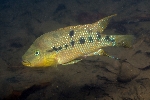Native fish, Cichlasoma istlanum, hide for longer, move and eat less in the presence of a non-native fish, Amatitlania nigrofasciata
Por De La Torre Zavala, Alexis Manuel, E. Arce Uribe, J. Luna-Figueroa, A. Córdoba-Aguilar
Environmental Biology of Fishes, 2018(101):1077–1082 20-abr.-2018. DOI: 10.1007/s10641-018-0761-z
" Introduction of non-native species is a problem worldwide. Local populations of the Mexican mojarra, Cichlasoma istlanum, have been hypothesized to be negatively affected by the introduction of the convict fish, Amatitlania nigrofasciata. The Mexican mojarra is a cichlid fish native to the Balsas-River Basin. As a first approach to understand the behavioral effect of the convict fish on Mexican mojarra, we experimentally studied the behavioral responses of the latter when exposed to the former. Thus, we recorded refuge use, swimming activity and feeding rate of Mexican mojarra in the presence of a convict fish, a conspecific, and alone. Mexican mojarra used refuges for longer, swum for shorter and ate less in the presence of convict fish than with conspecifics or alone. Because prolonged use of refuge habitat may deprive Mexican mojarra of opportunities to feed, grow, and reproduce, we hypothesize that convict fish can negatively affect the fitness of the former where the two species co-occur "
Clasificación: Comportamiento, Norteamérica.
Idioma: English
Referencia en bibliografía de especies (1)
Sustituciones de nombres
- Amphilophus istlanus tratada como Cichlasoma istlanum.
De La Torre Zavala, Alexis Manuel & E. Arce Uribe, J. Luna-Figueroa, A. Córdoba-Aguilar. 2018. "Native fish, Cichlasoma istlanum, hide for longer, move and eat less in the presence of a non-native fish, Amatitlania nigrofasciata". Environmental Biology of Fishes. 2018(101):1077–1082. DOI: 10.1007/s10641-018-0761-z (ffm09192) (resumen)
